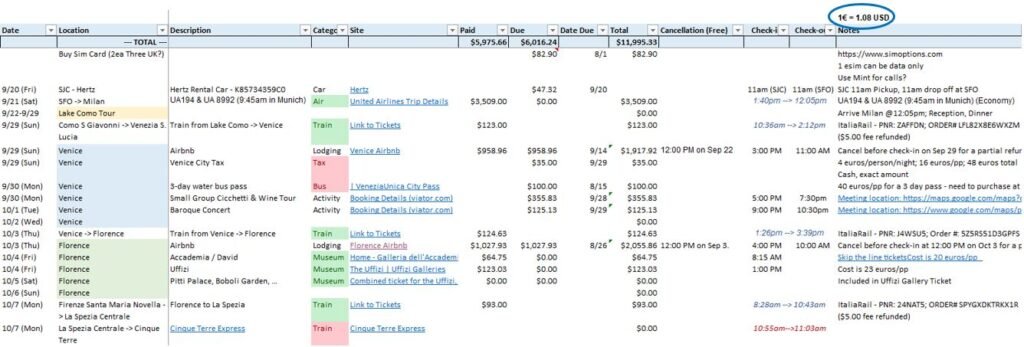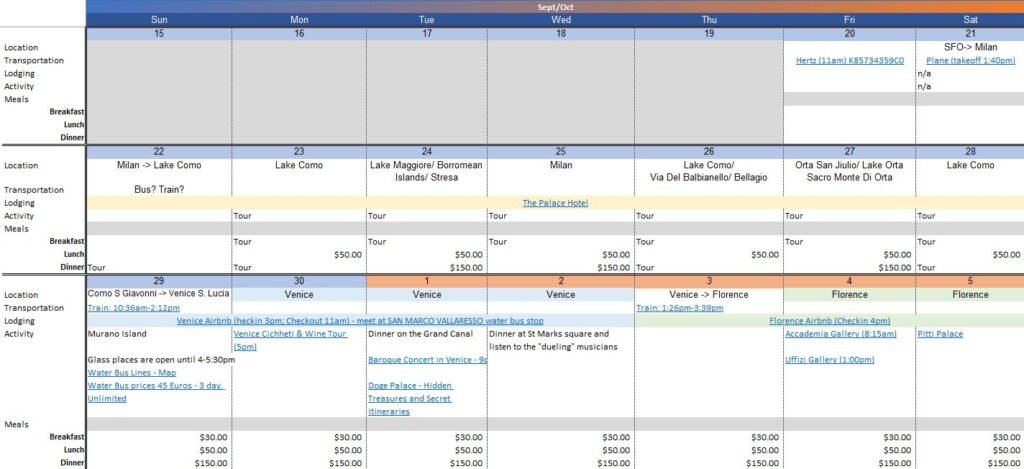There are many factors involved in planning your trip – How much is it going to cost? How are you going to get there? Where are you going to stay? What are you going to do once you arrive? Not only does it take time to gather this information, but it is also important to have it organized once you finalize the details of your upcoming trip.
When I am planning my trips, I have 3 steps I follow:
- Cost – Calculate an estimate of what it will take to travel to, stay in, and move around where you want to go.
- Organize – Now that you have purchased or reserved particulars for your trip, you need to organize it in a way to track when future payments are due, links to actual tickets or important information, and know where you are going when.
- Apps – Every company has an App, these days. Before setting out on your travels, make sure you download any applicable apps you will need
Cost
Developing a cost estimate will help you determine what you will be able to do based on the budget you have.
There are many travel expenses to consider – transportation, lodging. food, activities. The first 2 items – transportation and lodging are normally the 2 largest expenses that will impact your travel costs. When I am starting to put the details of my trips, how I am traveling and where I am staying are the first areas I start digging into and finalize as early as possible. Given the complexity involved in determining how and where, we need to delve into each one in more detail.
- Transportation – Depending on where you are going, how far away it is, and how much movement you are going to be doing while traveling, transportation costs may or may not be a significant expense.
- Accommodations – The right lodging can make your trip unforgettable, while the wrong choice can lead to disappointment. To ensure a comfortable and enjoyable stay, it’s essential to know how to find the best lodging for your vacation.
How much I am projecting my trip to cost is a grounding point for me – it is not the only factor; however, it is a significant influence. It will determine if I can travel for multiple weeks, can I afford everything I want to see? If seeing everything for the duration needed exceeds my budget, then I have a few options:
- Shorten my length of my trip to save on hotel, meals, etc.
- Move my vacation to an off-peak time when prices for most things are cheaper.
- Decide on an alternative destination that is less expensive.
By starting your search early, staying flexible, utilizing fare comparison websites, and following the tips mentioned in the links above, you can maximize your chances of securing affordable transportation and lodging within your budget.
This will not cover all of your expenses (meals, entertainment, etc.); however, transportation and lodging are the larger ticket items and will give you an estimate of how much each place will cost that you are considering.
Organize
You have booked or reserved transportation, lodging, and maybe an activity or two. What do you do with all of this data? To track costs (and when payments are due), as well as activities planned, I use the following spreadsheets
Contains all costs from the trip, including what is paid for and what is still due; when can I still cancel without a fee; what meals included, etc.. Note: I have the latest exchange rate in the right hand corner for any costs that might require a conversion.
To know where I am going and what I am planning on doing each day, I have “calendar”. For this trip to Iceland, a lot of the activities were done while driving. I would decide as I was driving whether to stop or not based weather and time of day
Apps
Post Covid, every company seems to have an App. Before you leave for wherever you are going, make sure to download, set up an account, and login to any applicable Apps you might need. Depending on where you are going, you might need to do some research as to which App is best for you (see “Parking” example below). To keep things clean on my phone, I create a travel folder and I put all of my relevant travel Apps in there. It makes it easier to find the travel App I am looking for, as well as delete my account and remove the App once I come back home.
If there is a way to download boarding passes or tickets for offline use, make sure to do that in case you are going to a place without Wi-fi or cell coverage.
- Airline, train, bus, rental car – what transportation are you taking? There will be an app for each one. Once you have purchased your ticket, ensure that your itinerary is accessible and before you board your plane, train, and/or bus, make sure your boarding pass is there. If you are picking up a rental car, make sure the pick up, drop off, and any additional items are captured in the app.
- Parking – we discovered this is Iceland – the only way to pay for parking in Reyjkavik and some of the parks and waterfalls was through the parking app. We had to do a little research because Iceland has 2 parking apps. One was for only Reyjkavik parking, and the other covered Reyjkavik and the national parks.
- Museums – if you purchase tickets ahead of time (allows you to skip the lines in most places), confirm your ticket and time/date in which you purchased them are showing in the museum App. You do not want to arrive and find out that your ticket is for the wrong day or a different time.
- Hotel – a lot of the hotels will use their App so you can check in ahead of time and your phone is the room key (prevents keys from being lost, wastage, etc.).
When I travel, even if I have all of the Apps installed, I will print out the critical items and have them with me – Plane, train, hotel, etc. You never know when you will be in a place without internet or your phone battery has died.
Once you return from your trip, make sure to take the time to delete your personal information from any Apps you are no longer going to use, and delete the App from your phone.

